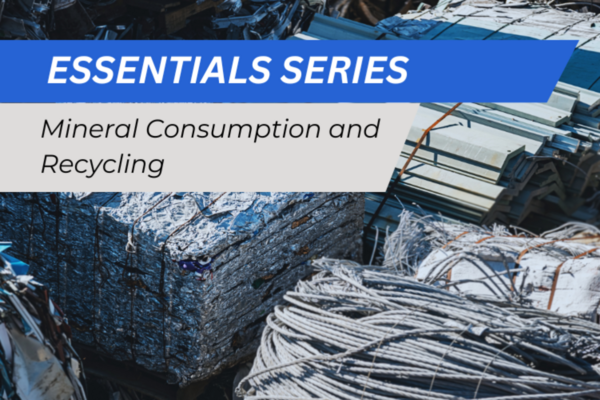
A Complete Learning and Reference Package for the Mining Industry! This bundle offers one-year access to Edumine Answers, the most comprehensive mining knowledge resource, and Introduction to Modern Mining, our flagship mining fundamentals course. Whether you're new to the industry or an industry veteran, this has got you covered. What’s Included? Edumine Answers Subscription – Our new interactive learning tool allows you to ask free-form questions and receive instant, accurate answers whenever and wherever you need them. The answers are drawn from our meticulously curated library of over 110 peer-reviewed courses, which are continuously updated to reflect the latest industry knowledge. Introduction to Modern Mining Course – A structured introduction to today’s mining industry, covering exploration, extraction, processing, sustainability, and investment. This course provides essential insights into modern mining practices and industry trends, making it the perfect starting point for industry newcomers. Who Is This For? Professionals and decision-makers who need quick, reliable mining insights Investors and analysts looking for expert-backed information on mining operations and markets Technical personnel such as geologists, chemists, engineers, data scientists, and procurement specialists seeking an accessible reference tool Students and newcomers wanting a structured introduction to modern mining Government officials, regulators, policy setters, and members of non-governmental organizations (NGOs). Equip yourself with one year of unlimited expert access and a strong industry foundation with the Edumine Fundamentals Bundle—your key to navigating the modern mining world with confidence! Why Edumine Answers? Watch the 1 Minute Demo Read more

The Smartest Way to Learn in Mining! We are excited to announce that Edumine is now leveraging cutting-edge AI technology to enhance your learning experience! Our new interactive learning tool allows you to ask free-form questions and receive instant, accurate answers drawn from our meticulously curated library of over 110 peer-reviewed courses. Subscribe now and get 12 months of access! The first stop for learning and decision-making in a rapidly evolving industry, bridging the gap between experience and instant knowledge. Edumine Answers is an AI-powered mining knowledge tool that provides instant, expert-vetted answers to technical, operational, and strategic questions. Whether you’re an engineer, geoscientist, mine manager, HR professional, or investor, Edumine Answers delivers instant answers whenever and wherever you need them. Watch the 1 Minute Demo Read more

Master the Complexities of Mining Sales Unlock the strategies and skills you need to thrive in the unique and challenging world of mining sales. This course provides sales professionals with the tools to build lasting client relationships, tailor sales approaches to high-stakes mining deals, and effectively communicate value to industry decision-makers. Who is this course for? This course is designed for sales professionals new to the mining industry or those seeking to enhance their knowledge and approach to selling in this high-value, long-cycle sector. What you’ll learn Understand the Mining Sales Cycle: Gain insight into the extended timelines, high-value transactions, and multi-stakeholder dynamics that characterize mining sales. Tailored Sales Techniques: Apply sales methodologies designed for large-scale mining industry deals to close more efficiently. Build Lasting Client Relationships: Learn how to foster trust and secure repeat business with strong client connections. Communicate Value Effectively: Articulate value propositions that address technical, operational, and financial perspectives. Overcome Complex Sales Challenges: Navigate objections, handle group selling situations, and lead structured conversations that align with the buyer’s decision-making process. Take the first step toward mining sales success. Enroll today and transform your approach to selling in this niche industry. Author Adam Basheer Need to train a team? Whether you're looking for a customized training program or developing a team, we have enterprise solutions to fit your needs. Learn More Read more

About the Course This course provides a non-technical introduction to the basic concepts of mineral consumption and recycling, with numerous examples, figures and images of mining. Explore the complex dynamics of mineral consumption, supply, demand, and recycling, and their implications on the mining industry and global resources. Explore sustainable mining practices and the role of small-scale miners in today’s global economy. Learn about recycling's impact as a complementary approach to mining, and its environmental and economic benefits. Explore the dynamics of recycling through concepts such as the "Law of Recycling", recycling rates, recovery rates, and the challenges in the recycling process. Learn about different metals, their recycling timelines, and the factors influencing effective recycling. Audience High school science Author Dr. Marcello Veiga Need to train a team? Whether you're looking for a customized training program or developing a team, we have enterprise solutions to fit your needs. Learn More Read more

Planificación minera 1: Estrategia le presenta los conceptos clave de la planificación minera. El proceso de planificación minera es complejo e integra varias ramas técnicas de la disciplina minera, incluidas la mecánica de rocas, la rotura de rocas, la ventilación y el diseño de minas. Si bien los planificadores de minas deben esforzarse por diseñar e implementar planes que sean seguros, ambientalmente sostenibles y socialmente aceptables, el factor primordial en el éxito de una operación minera y lo que en última instancia determina si se llevará a cabo a través de estudios de factibilidad y luego se llevará a cabo la construcción y el desarrollo es el nivel de rentabilidad. El impulso para explotar un recurso mineral de manera que agregue tanto valor como sea posible al negocio minero requiere una actualización continua del plan de la mina y la rápida implementación de cualquier oportunidad de agregar valor a medida que surja. Se supone que los participantes del curso tienen un buen conocimiento de los términos y descripciones de la minería, han estado expuestos a métodos de minería de superficie y subterránea, están familiarizados con el desarrollo, las operaciones y la producción mineras y están interesados en aprender a planificar una mina con el propósito de maximizar el valor. También se espera que los participantes del curso tengan conocimientos básicos de mecánica de rocas, rotura de rocas, ventilación, equipos mineros típicos y otros fundamentos técnicos que forman la plataforma y las limitaciones para generar planes mineros. Alcance Este curso se centra en los conceptos principales asociados con la investigación del impacto financiero de una serie de palancas clave en el valor de un plan minero. Este curso no investiga los conceptos técnicos básicos necesarios en la minería. Se supone que se han establecido todos los parámetros técnicos y que son factibles. Por lo tanto, el enfoque se centra en establecer la optimización financiera mediante la planificación y la generación del mejor plan minero. Este curso tampoco enseña el uso de software de planificación y diseño de minas que, en algunos casos, puede incorporar los conceptos analizados en el mismo. Autores: Micah Nehring Shahriar Shafiee Duración: 14 horas Categoría: Minería Fecha de la versión: 16 de septiembre de 2013 Read more

About the Course This course provides a non-technical introduction to the basic concepts of geology and mineral exploration, with numerous examples, figures and images of mining. Explore the essential geological concepts, mechanisms of mineral formation, and techniques for finding mineral deposits. Understand the structure of the Earth, mineral definitions, and ore grades. Learn about the contrasting formation processes of two types of carbons. Understand the geological conditions for carbon formation and their global distribution. Explore the process of how weathering forms metal deposits. Understand the conditions and chemical reactions involved. Learn about various ore deposit exploration methods, from remote sensing to drilling, and understand their importance in the mining industry. Audience High school science Author Dr. Scott Dunbar Need to train a team? Whether you're looking for a customized training program or developing a team, we have enterprise solutions to fit your needs. Learn More Read more
Shopping Cart
Your cart is empty
